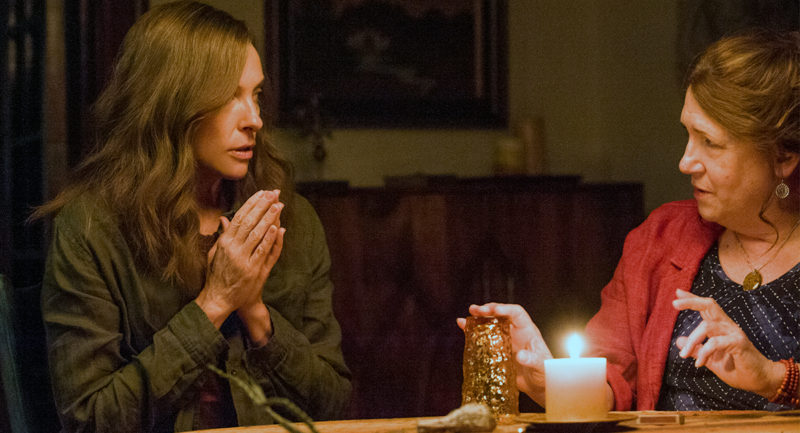Hereditary
Director: Ari Aster
Cast: Toni Collette, Gabriel Byrne, Milly Shapiro, Alex Wolff and Ann Dowd
Studio: Elevation Pictures
3/5
It seems as though Hollywood is sweet on witches these days.
And I do mean Hansel and Gretel sweet as two youngsters are lured into the world of spiritualism unwittingly, in grand part of their lineage.
Hereditary is a tale of a family seeking its way through the death of their grandmother. It’s a journey of apathy and indifference. However, there’s greater concern for Charlie, the daughter, who forgets her EpiPen at home and is caught munching casually on a chocolate bar (sans nuts) at the funeral.
There’s an underlying context to Charlie that’s unsettling. The 13-year-old is a loner and her approach to death – cutting off the head of a dead pigeon with scissors – adds to underscores her struggle with social cues.
They reach their peak when older brother, Peter, is told to bring his sister to a “school barbeque”. The ties between her and her brother are not made clear initially, but when she eats a piece of cake with nuts in it, Peter shows his concern by cradling her in his arms
Agoraphobia makes its presence known as he speeds through the vacuum of night, only to be swerved off course by a dead deer. That’s when tragedy strikes and Annie’s downward spiral is a stream of projectile vomit.
Though the film, directed by Ari Aster, touches on the topic of hauntings, the brief outline of her grandmother that Annie (Toni Collette) sees in her dollhouse workshop is the only apparition we see, or sense, of the grandmother. Everything revolves around the untimely demise of the youngest child, Charlie.
However, the great menacing fear of Hereditary comes from the dollhouse aesthetic and the agoraphobia. In contrast to Annie’s pristine dollhouse dioramas, Charlie creates grotesque figures out of waste.
As the film progresses, though, we see that same theme of disfigurement reveal itself as Annie slowly loses her grip on the world.
The stacked dollhouses tower in the corner by the stairs, as well as the locks and cages on the piece by the front door show the underlying emotions. These are hinted at by the previous dioramas Annie has worked on.
Dollhouses aren’t the forefront but a nice driver of the narrative. The family dynamic finally breaks when Annie destroys her artwork.
In her vulnerability she is drawn into the world of spiritualism – thinly veiled dark arts – by Joan.
Overall the haunting theme is not over-powering like a James Wan production, but it’s still present and just as sinister. But the storytelling is not linear. Though Hereditary is being labelled too arthouse, it’s lack of filling in necessary items of information limit how much we should feel for the characters.
It’s acknowledged that Charlie’s demise is an accident caused by Peter. However, the spirits are still vengeful. And Annie is unforgiving. But Peter’s contempt for his mother runs far deeper than teen angst.
Throughout the film Annie’s ambivalence to her son — there’s not one scene with them interacting in the first hour — is obvious. But her disdain is revealed as she unravels. She admits to her new friend Joan that she sleepwalks, and one particular incident had her wake up after striking a match. Annie and her two children were doused in paint thinner.
In the end, Annie is punished just as much as her offspring. That’s also the point where the film falls flat on its face. After Peter makes his escape from his family home, the scene of naked sycophants of the grandmother — a queen of the dark arts — is preceded by hokum.
Now, I predict witches and witchcraft will become a tired trope in horror. The supernatural subgenre has already seen this with the Paranormal Activity series, as well as The Witch and the impending Suspiria remake. For now, it’s just a revival.
I feel, even with the great cinematography, and stalwart acting of Collette, Hereditary continues to perpetuate witchcraft as being in league with the Devil.
And that’s not living deliciously, is it?

